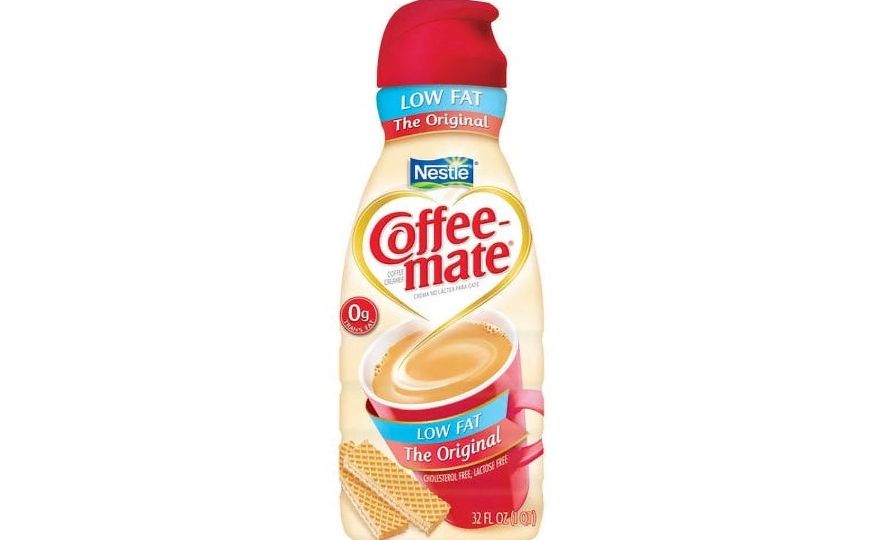
Coffee Mate is widely recognized as a staple in many households and offices, offering a convenient non-dairy alternative to traditional milk or cream for coffee. However, its health impacts, particularly concerning trans fats, have raised significant discussions. Trans fats are known for their adverse effects on heart health, potentially increasing the risk of heart disease by negatively altering cholesterol levels.
Does Coffee Mate Contain Trans Fat?
Yes, Coffee Mate does contain trans fats, albeit in small amounts. This is due to the use of hydrogenated oils in its formulation. Despite the packaging often stating “0 grams per serving,” it’s important to understand that this label can be misleading. In the U.S., food products containing less than 0.5 grams of trans fats per serving are legally allowed to be labeled as “0 grams of trans fat.” This means consumers might unknowingly consume more trans fats than they realize if they use multiple servings.
Key Takeaways
- Trans Fat Presence: Coffee Mate can contain up to 0.49 grams of trans fat per serving, which isn’t listed due to labeling laws that allow “0g Trans Fat” if under 0.5 grams.
- Health Risks: Regular consumption of Coffee Mate, with its trans fats, increases the risk of heart disease and negatively impacts cholesterol levels.
- Legal Issues: There have been class action lawsuits against Coffee Mate regarding misleading health claims about trans fat content.
- Consumer Concerns: Many consumers feel misled by the “0g Trans Fat” label, unaware that they are consuming harmful trans fats.
- Healthier Alternatives: Options like Coffee Mate Natural Bliss, which uses natural ingredients and contains no trans fats, along with other non-dairy creamers like almond or soy milk, offer healthier choices.
- Label Misleading: “0g Trans Fat” labels can be deceptive, leading to unintentional consumption of small amounts of trans fats that can accumulate with multiple servings.
Health Implications of Trans Fats in Coffee Mate
Trans fats are not just any fat; they are among the most harmful you can consume. Regular intake of trans fats can lead to an increase in “bad” LDL cholesterol and a decrease in “good” HDL cholesterol, which significantly boosts the risk of heart disease and strokes. Coffee Mate, containing these trans fats, albeit in small amounts, poses a risk when consumed frequently or in large quantities. This risk isn’t just hypothetical. Studies and health experts align on the dangers, particularly emphasizing the long-term impact on heart health.
The specific ingredients in Coffee Mate, such as partially hydrogenated oils, are responsible for its trans fat content. Even though the amounts per serving might seem negligible, the cumulative effect over time can be substantial, especially for those who consume Coffee Mate regularly. It’s a classic case of small quantities adding up, potentially leading to significant health issues like increased heart disease risk and higher cholesterol levels.
Legal and Consumer Response to Coffee Mate’s Trans Fat Content
The presence of trans fats in Coffee Mate has not just been a health concern but a legal one as well. There have been class action lawsuits filed against the makers of Coffee Mate, accusing them of misleading consumers about the health implications of their product. These lawsuits highlight the tension between marketing practices and consumer rights, especially regarding health claims.
Consumer reactions have been strong and vocal, with many expressing their dismay upon learning about the trans fat content and its possible health risks. Testimonials from individuals who believed they were choosing a healthier option reflect a sense of betrayal and concern over the transparency of labeling practices. Such responses underscore the critical need for clear and honest communication about ingredients that could impact consumer health.
Comparing Coffee Mate to Healthier Alternatives
When it comes to choosing a creamer for your coffee, the options are plentiful, but not all are created equal in terms of health benefits. Coffee Mate is popular for its flavor and convenience, but its trans fat content and the use of artificial ingredients may raise health concerns for some consumers. In contrast, there are several healthier alternatives available that do not contain trans fats and offer additional health benefits.
One of the key distinctions between Coffee Mate and healthier alternatives is the presence of trans fats, primarily from partially hydrogenated oils in Coffee Mate. These trans fats are associated with negative health effects, such as increased risk of heart disease and higher bad cholesterol levels. Healthier creamers often use natural or less processed fats that do not carry these risks.
Health-conscious consumers might consider switching to creamers that use simple, natural ingredients. Options like almond milk, coconut milk, and soy milk creamers are excellent non-dairy alternatives that are not only free from trans fats but also provide essential nutrients such as calcium and vitamin E. These alternatives tend to be lower in calories and fat compared to traditional dairy creamers and Coffee Mate, making them a better choice for those looking to maintain a healthier diet.
Another great option is oat milk creamer, which is known for its creamy texture and slight sweetness without added sugars. Oat milk is high in fiber and can be a heart-healthy addition to your coffee. For those who prefer a bit of flavor in their creamer, many natural creamers offer vanilla, caramel, and hazelnut flavors without relying on artificial ingredients.
When choosing a healthier creamer, look for products with short ingredient lists, indicating fewer processed components and no artificial additives. Brands like Califia Farms, Silk, and Nut Pods offer a range of non-dairy creamers that prioritize health without compromising on taste.
FAQs
Does Coffee Mate Natural Bliss contain trans fats?
Coffee Mate’s Natural Bliss line is marketed as a more natural alternative to their traditional creamers. These products typically use real milk or cream and claim not to include artificial additives or trans fats. This makes them a preferable choice for those trying to avoid trans fats in their diet.
How does the trans fat content in Coffee Mate compare to other creamers?
Coffee Mate traditional creamers may contain up to 0.49 grams of trans fats per serving due to the inclusion of partially hydrogenated oils, even though they are labeled as “0g Trans Fat.” This contrasts with many other creamers, especially non-dairy and natural options, which often do not contain any hydrogenated oils and therefore have no trans fats.
What are the implications of “0g Trans Fat” labeling?
The label “0g Trans Fat” can be misleading because it is legally allowed if the product contains less than 0.5 grams of trans fats per serving. This means that while the trans fat content is low, it is not zero, and regular consumption could lead to significant intake of trans fats, which are harmful to heart health.
Final Thoughts
Throughout this article, we’ve explored the presence of trans fats in Coffee Mate and its implications for health. Coffee Mate does contain small amounts of trans fats due to the use of partially hydrogenated oils, which can add up if consumed regularly. For those concerned about their trans fat intake, considering the Natural Bliss line or other healthier creamer alternatives like almond milk, coconut milk, or oat milk creamers can be a wise choice.









